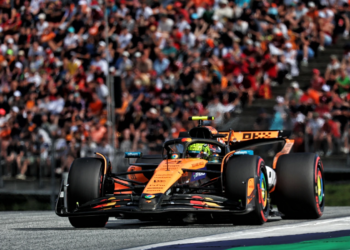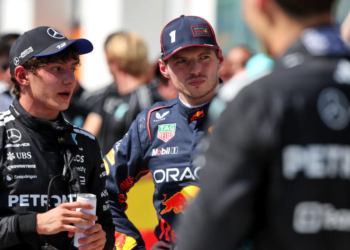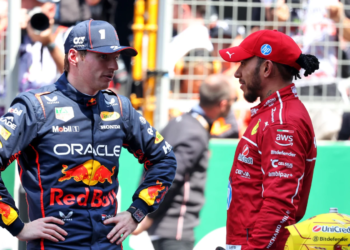‘How did you go bankrupt?’
‘Two ways. Gradually, then suddenly.’
You may recognise these as being the words of Ernest Hemingway in his novel The Sun Also Rises. They pre-date F1 by several decades, but their appropriateness to the sport’s recent days and weeks and what they’ve confirmed about its solvency is striking.
The edifice crumbled with exasperating suddenness – Caterham and then Marussia’s administrations, followed by confirmation from three other teams that they too are sailing very close to the wind, and then by Marussia ceasing trading definitively, all landed like repeated left-right blows.
But just as with Hemingway’s experience even though the tipping point was sudden the building of pressure was gradual, and a long-time coming. Indeed we can trace it all the way back to 2009 – perhaps sooner – when then-FIA President Max Mosley sought to wrestle the sport’s desire to spend itself out of existence.
Appropriately too, as Hemingway’s novel popularised the notion of ‘the lost generation’, Mosley’s four-team new generation brought in then is now all but lost, with only Caterham of them left and itself clinging to the vestiges of existence.
And Eddie Jordan in Interlagos for one had little doubt as to what had caused it all: ‘There are four reasons why the three teams who entered F1 in 2010 have all failed’ he said (note the fourth was USF1 which didn’t even make the grid).
‘First, Caterham (previously Lotus), Marussia (previously Virgin) and HRT were promised that the sport would have a budget cap of 50m Euros and governing body the FIA failed to impose this. Secondly, the costs for an engine were about £5m last year but have gone up to £15m this season with the introduction of new turbo hybrid engines.
‘Who’s accountable? It’s Bernie Ecclestone’s job to make sure promises are adhered to, and these costs are not coming down next year even though the manufacturers originally said they would.’
‘Thirdly, teams have to use Ecclestone’s freight but the costs of this are high. There used to be a £10m payment from the commercial rights holder to teams to support the freight costs but Ecclestone withdrew that two years ago.
‘Fourthly, there is the gross disparity of $300m being skimmed off the top of the money allocated to pay the teams as a cash payment for the top five teams, Red Bull, Ferrari, McLaren, Williams and Mercedes.’
In short, cost control flopped, with in addition to the cost cap never happening Ferrari and Red Bull later cut and run from FOTA (taking their ally teams with them), then emerged with lucrative deals from Bernie as if by magic not long afterwards. This resulted not only what cost control there was in the resource restriction agreement crashing and burning but also a vastly concentrated F1’s available wealth with the few at the top. By definition there was less for everyone else. That a vast swathe of revenue goes off to CVC, following a deal that Bernie inked, doesn’t help either.
And as EJ touched upon various matters have ensured that the minimum cost of just turning up in F1 has since ballooned, to around £70m per year; a level apparently over the ability of the teams at the back to raise. Many of the costs – power units, tyres etc – are non-negotiable and have increased rather arbitrarily over time, as Lotus’s Gerard Lopez outlined so eloquently in Austin. Don’t believe for a second the claims made by the likes of Toto Wolff, Eric Boullier as well as (repeatedly) by Bernie that what is happening reflects a Darwinian cull of those outfits which are not being sufficiently prudent.
I’m not the first to point out the absurdity of a sport that is thought to generate $1.8bn per year in operating profit apparently not being able to support 11 teams each making 20 appearances.
Bernie during Austin’s weekend in response to the gathering storm issued a mea culpa. Saying that ‘there is too much money being distributed badly – probably my fault’ (some cynics reckoned the word he should have chosen instead is ‘definitely’).
‘I know what’s wrong, but don’t know how to fix it’ he went on, before going on to utter several words to the effect that the ball now was in the teams’ court to re-distribute the cash, as there’s nothing he can do without their say-so.
On the face of it an astonishing admission of impotence and failure. Adam Parr the ex-CEO and Chairman of Williams wasn’t having any of it though, reckoning it merely the latest case of Bernie’s divide and rule, tweeting: ‘Masterful diversion. Pits the big against the small teams. But it’s not the teams that take out too much from F1.’
And whatever was the case it by my reckoning was disingenuous for Bernie to imply it was now over to the teams. Mainly because it was the very same Bernie that offered the select few at the top the grossly inflated deals in the first place, and it was hardly unforeseen that the resultant skew in cash distribution was asking for trouble. The said teams were never going to turn the deals down; they obviously are going to look out for number one. To return to Hemingway for guidance on this: ‘Everyone behaves badly–given the chance’.
As for the claim that there’s nothing he can do to fix it now, such an admission would have been unthinkable from Bernie past. Time was that Bernie helping out struggling teams with upfront payments, or even more than that, was routine (I recall Martin Brundle quipping about ‘Ecclestone-Minardis’ after he went so far as to buy into Minardi in 2003), and the rest wouldn’t argue. These days either he won’t or he no longer can. Whichever way it doesn’t look good.
Criticism of Bernie from the fraternity used to be as rare as hen’s teeth, such was his complete control. His rule was in part by fear but based also on achievement.
Of course, in the past there was plenty of achievement, but what more recently? As outlined Bernie’s fingerprints are all over the sport’s current mangled state. Really the only part of it that can’t be laid at his door is the power unit cost; Bernie famously, or infamously, being against those from the very inception. Max Mosely was right that the sport seriously missed a trick in not restricting the amount that manufacturers could sell the units to its customers for. Instead we now have the small teams subsidising the big players’ R&D in effect.
But to get back to Bernie’s rap sheet there’s plenty on it in addition to the sport in crisis. Chief among these is the CVC deal and its various manifestations – not least Bernie’s bribery trial which ended rather unsatisfactorily, and left him rather as damaged goods.
And then – related to the money-guzzling CVC deal to whatever extent – the sport has increasingly based its financial model on demanding vast hosting fees from venues, which has had the multiple negative impact of both sky-rocketing ticket prices at existing Grands Prix as well as taking the sport away from its core support to up sticks instead in new territories, where in a lot of cases the locals don’t appear terribly interested. This even worse often associates the sport with, shall we say, questionable governing regimes who wield the chequebooks.
It’s also manifested itself in the sport demanding vast fees for TV rights, meaning TV coverage disappearing behind paywalls. In other words the fans are the ones to miss out, and to fork out.
Bernie with equal suddenness appears to be running out of friends also. In his heyday he could rely largely on subservience from the F1 media. He still gets some – as was shown gaudily when for example a couple of F1 journalists that I saw swallowed Bernie’s ‘over to the teams’ comments unquestioningly. But some cracks are appearing.
Maurice Hamilton for one, someone who has been writing about this game since the mid-1970s and therefore has first-hand experience of much of what Bernie’s done for F1, noted in recent days: ‘I don’t know about you but it seems to me that the real world has finally caught up with Bernie Ecclestone…In one or two interviews at the (Austin) weekend, his appearance and silly answers made him appear a man under siege and all of his 84 years…The impression you have now is that no one has the first idea what’s going on. Least of all the man attempting to give out the hymn books.’
Even the staple-diet journal of Autosport got in on the act, with Jonathan Noble writing in his latest column: ‘What is intriguing is not what the solution is – for that will very much depend on how seriously CVC is taking the current situation – but whether the cost crisis has offered us a glimpse of Ecclestone starting to lose his stranglehold over F1.’
To return to Eddie Jordan’s words outlined above, time also was that Bernie and Eddie were as thick as thieves; it apparently used to be said in the paddock that you never say anything to EJ that you’re not also happy for BCE to know. But even now Eddie’s not hesitating to point the finger firmly at Bernie for the sport’s predicament.
Worse Bernie’s words in Austin hinted at a man rather out of time; not adapted to the new ways of the team principal not also being the owner (unlike Chapman, Williams, Dennis, Tyrrell et al), him bemoaning that: ‘In the old days, the people sitting around a table would be the guys who could say yes or no. They would ask me to sort it out and it would be sorted. But none of the modern guys can agree anything, even if they wanted to. They all have to report back to somebody’.
As Hamilton noted also his words in public in Austin more generally on occasion appeared rather incoherent and bewildering – earlier in proceedings he once again brought up the subject of engine noise like it was the most pressing matter.
We should be careful of course, Bernie as we know if the master of misdirection. I recall it being said (I think by Joe Saward but don’t quote me on that) that when Bernie speaks you should think of it as like a magician creating a cloud of smoke and shouting ‘abracadabra!’ However tempting it is to have your attention taken by the shout and puff of smoke, what’s actually happening is elsewhere.
In this ilk I’ve read it theorised that his latest round of criticisms of the sport was his seeking a more favourable deal from CVC in buying the sport back, as well as in warding off the FIA and possible challenge to his 100-year deal. Perhaps even it was a prelude to him leading a ‘GP1’ style breakaway from the FIA. Others reckoned it was simply Bernie’s latest round of deflection and division. But it’s worth reflecting that had anyone else said them we’d feel safe to conclude that they were ramblings akin to those of an elderly relative at a wedding who’s had a few too many shandies. Possibly, sometimes, we shouldn’t rule out concluding the obvious.
As for the broader situation that F1 is heading towards the idea has burgeoned that rather than lethargy it instead is a matter of strategy. That – for whatever reason – Bernie and a cabal of big teams want the squads below to drop over the precipice so that the sport is an effective carve-up for them. With the resultant deficit made up either by three-car teams or as few as five constructors (which would be Ferrari, Red Bull, Mercedes, McLaren and perhaps Williams) each with a customer ‘B team’ buying a chassis from its parent. At the very least, even if this destination wasn’t deliberate those powerful players didn’t appear too perturbed in Austin now that they’re reaching it.
Force India’s deputy team principal Bob Fernley said so in public that he reckoned this could be Bernie’s endgame, and the tone and words of the likes of Wolff in the team principals’ press conference that weekend didn’t do a great deal to emolliate those concerned either.
In a major plot twist however CVC of all entities has since intervened reportedly (for the first time anyone can remember) and done so in terms of promising to help the struggling teams out, perhaps by giving up some of its own financial cut. Which of course may tell us something much bigger in terms of the relationship between Bernie and his employer – it wading in presumably to protect an asset being devalued cannot reflect well. Which brings us to likely the greatest dilution of Bernie’s power in F1. That he doesn’t own the commercial rights; he sold them to CVC. Meaning Bernie is a mere employee of it lest we forget, albeit a well-rewarded one. Certainly if Bernie’s ploy for the small teams to drop off was indeed a strategy it appears that CVC does not support it.
Further it tells us that the amoral, money-grabbing venture capitalists whom we’ve got well used to portraying as a pantomime villain apparently cares more about the survival of F1 as we know it, or at least is prepared to do more about it and make more of a sacrifice so to do, than dear Bernard Charles. Just stop and think about that for a moment.
And with all of this what do we have? A man who has got the sport into a place that very few are content with, possibly too with a future plan that will maul the F1 we know, and whose power base appears to have evaporated. Bernie’s surprised us before, but you could now ask what exactly he offers?
Might Bernie be another to find that his F1 existence will erode gradually, then suddenly?






